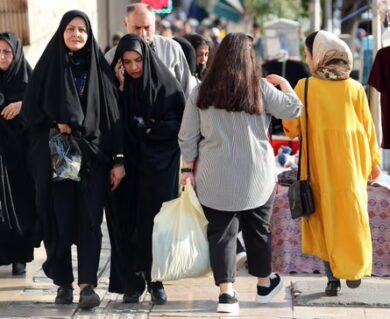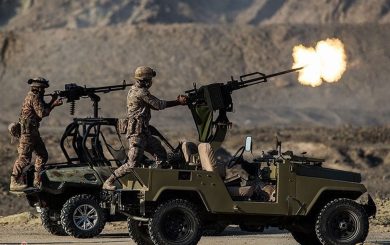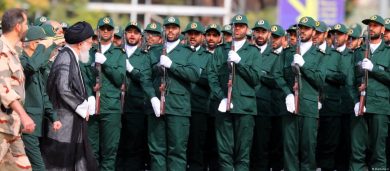The Islamic Revolutionary Guard Corps (IRGC) has long been the primary enforcer of state oppression in Iran, targeting political dissent, ethnic minorities, and activists. However, one of its most systematic campaigns has been its war on women, using fear, intimidation, and violence to suppress their rights and freedoms.
From compulsory hijab laws to imprisoning activists, the IRGC plays a direct role in shaping policies that control women’s bodies, voices, and lives. Women who resist this oppression face arrests, torture, surveillance, and digital censorship, as the regime seeks to silence any challenge to its authority.
This article explores:
• How the IRGC enforces gender oppression through laws and intimidation.
• The tactics of fear and control used to suppress women.
• The stories of brave Iranian women resisting the IRGC.
• The global response to the IRGC’s war on women.
1. The IRGC’s Role in Enforcing Gender Oppression
A. The IRGC as the Guardian of Patriarchy
The IRGC is not just a military force—it is the backbone of the regime’s ideological control. It works alongside the morality police, judiciary, and intelligence forces to enforce:
• Compulsory hijab laws, punishing women for not covering their hair.
• Strict gender segregation, limiting women’s participation in public life.
• Legal discrimination, where women have fewer rights in marriage, divorce, and child custody.
The IRGC’s paramilitary arm, the Basij, patrols streets, detains women for dress code violations, and enforces state-mandated morality.
B. The Hijab as a Tool of State Control
The mandatory hijab is not just a religious law—it is a political weapon. The IRGC uses it to:
• Deny women autonomy over their own bodies.
• Justify arrests and crackdowns on women’s protests.
• Label defiant women as threats to national security.
Women who remove their hijabs risk fines, arrests, and imprisonment, and some have even died in police custody, as seen in the case of Mahsa Amini, whose death sparked nationwide protests.
2. The IRGC’s Tactics of Fear and Control
A. Mass Arrests and Imprisonment
The IRGC Intelligence Organization (IRGC-IO) regularly arrests women activists, journalists, and ordinary citizens who protest gender discrimination. They are often charged with:
• “Propaganda against the state.”
• “Corrupting society through improper dress.”
• “Acting against national security.”
Many women face sham trials, leading to harsh prison sentences in Evin or Qarchak prisons, where torture is rampant.
B. Torture, Sexual Violence, and Psychological Abuse
Women detained by the IRGC endure:
• Beatings, electric shocks, and solitary confinement.
• Threats of rape and sexual violence to break their spirit.
• Forced confessions, often broadcasted on state TV.
The IRGC uses these tactics of fear to deter other women from joining protests or defying the regime.
C. Digital Repression and Surveillance
The IRGC controls Iran’s cybersecurity and digital surveillance, monitoring women who:
• Post anti-regime content online.
• Share images of themselves without hijab.
• Speak out against gender-based violence.
Women journalists and activists who challenge the regime online often face hacking attempts, doxxing, and online harassment by IRGC-backed groups.
3. Stories of Women Resisting the IRGC
A. Narges Mohammadi: A Nobel Prize Winner Behind Bars
• A human rights activist imprisoned multiple times for defending women’s rights.
• Has written about abuses against female prisoners under the IRGC’s rule.
• Despite being jailed, she continues to expose the IRGC’s crimes.
B. Masih Alinejad: The Digital Voice of Iranian Women
• Exiled journalist who launched the #MyStealthyFreedom campaign.
• Target of IRGC assassination and kidnapping plots for encouraging women to remove hijabs.
• Continues to amplify Iranian women’s resistance globally.
C. Sepideh Gholian: A Journalist Who Refuses to Stay Silent
• Arrested and tortured for reporting on labor strikes and women’s rights.
• After her release, she publicly defied the IRGC outside Evin Prison, leading to her re-arrest.
• A symbol of unbreakable resistance against Iran’s security forces.
4. The Global Response to the IRGC’s War on Women
A. Sanctions Against the IRGC for Gender Oppression
Countries like the United States, Canada, and the European Union have imposed sanctions on IRGC officials responsible for:
• Crimes against women protesters.
• Arrests and torture of activists.
• Enforcing morality laws.
However, more nations must designate the IRGC as a terrorist organization to weaken its power.
B. Supporting Digital Freedom for Iranian Women
To counter IRGC surveillance, international organizations are:
• Providing VPNs and encrypted messaging tools for activists.
• Helping women document human rights violations securely.
• Bypassing state-controlled internet blackouts to amplify women’s voices.
Digital resistance is a key part of defying IRGC censorship.
C. Women-Led Protests Inspire Global Feminist Movements
The “Women, Life, Freedom” movement has sparked:
• Global rallies in cities like Berlin, London, and New York.
• International media coverage of Iran’s women-led uprising.
• Greater awareness of gender apartheid and authoritarian oppression worldwide.
The Iranian women’s struggle is not just national—it is a global fight for freedom.
5. What the World Must Do to Stop the IRGC’s War on Women
A. Designate the IRGC as a Terrorist Organization
• The U.S. already lists the IRGC as a terrorist group—other nations must follow.
• This will block IRGC-linked assets, limit their funding, and cripple their operations.
B. Provide Support for Iranian Women Activists
• Offer asylum and protection for those fleeing persecution.
• Ensure international legal action against IRGC human rights violations.
• Support grassroots Iranian feminist organizations working to protect women’s rights.
C. Amplify the Voices of Iranian Women
• Continue media coverage of women-led resistance in Iran.
• Support independent Iranian journalists reporting on human rights abuses.
• Promote solidarity campaigns that highlight Iranian women’s fight for justice.
6. Conclusion: Women Will Defeat Fear and Oppression
Despite the IRGC’s war on women, Iranian women refuse to be silenced. Their resistance, whether on the streets, in prisons, or online, proves that no amount of fear can stop the fight for freedom.
From Narges Mohammadi’s activism behind bars to Masih Alinejad’s digital defiance, Iranian women are shaping the future of a free and equal Iran.
Join Our Newsletter!
Stay informed with the latest updates, news, and ways to take action in the fight for justice and global security. Sign up now to get updates delivered straight to your inbox!





